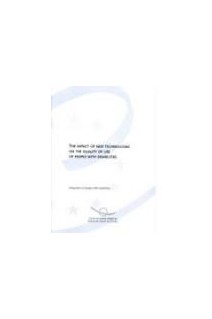This report analyses the impact of new technologies on the quality of life of people with disabilities, including consumer technology and, of course, assitive technology.
It takes into account the different types of disability, covering not only physical and sensorial impairments, but also intellectual disabilities, mental illnesses and restrictions in social participation due to personal or environmental factors.
The study gives examples of good practice and indicates the strengths, weaknesses, opportunities and threats of new technologies for enhancing the quality of life of disabled people. Proposals are made for such enhancement through legislation, service delivery, design, standardisation and market development.
It concludes that new technologies can improve the quality of life for people with disabilities, provided a coherent set of actions is put in place to avoid new barriers for disabled people and in order to attain a society for all.




